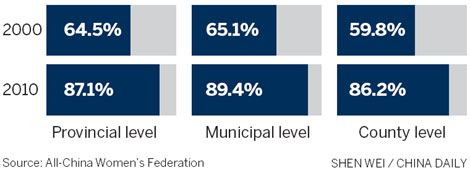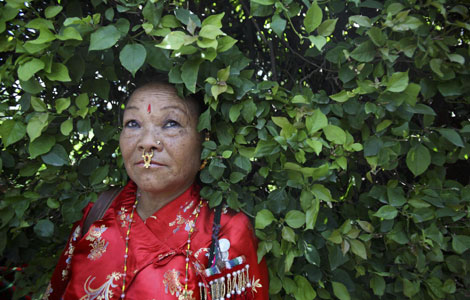Women seek larger role
Updated: 2011-08-10 07:17
By He Dan and Cang Wei (China Daily)
|
|||||||||||
BEIJING - China is striving to improve the political influence of women by ensuring more positions for them in the country's government departments, Song Xiuyan, deputy head of China's top women's organization, said at a news conference on Tuesday for a new 10-year working plan for women.
Chinese women have played important roles in the country's economic and social development, said Song, vice-president of the All-China Women's Federation and deputy director of the National Working Committee on Children and Women.
The 2011-2020 Outline for Chinese Women's Development stipulates that all local governments above the county level should have more than one female leader by the end of 2020.
|
 |
Song stressed that China has achieved remarkable progress in enhancing women's political participation as more than 86 percent of local governments at the provincial, municipal and county levels had female leaders by the end of 2010, while 10 years ago only about 60 percent of the governments of the three levels offered policy-making positions to women.
Moreover, China has three deputy chairwomen out of 13 chairpersons in the Standing Committee of the National People's Congress as well as four deputy chairwomen leading the National Committee of the Chinese People's Political Consultative Conference, Song added.
However, "we still have a lot of work to do to raise social awareness and guarantee gender equality," Song said in response to a question about a lack of female representation at higher levels of government.
"Of course I want to become a leader in the future the same as my male colleagues, but as a woman, I can't sacrifice a lot of time with family to socialize with leaders, which is vital for promotion," said Kuang Lidong, a 25-year-old public servant from Leiyang city, Central China's Hunan province.
"Many Chinese women still prefer to devote themselves to families rather than participate in politics due to the influence of traditional culture," said Sun Xiaomei, a professor with the Chinese Women's University.
She also said that China is still a male-dominated society, in which men always think women should be taken care of. Thus Chinese women in politics often work in those "not-so-tiring fields", such as education, culture and health.
"Chinese women's retirement age also contributes to their low participation in politics," said Sun. "Men at the age of 50 still have chances to get promoted because they mostly retire at 60, while women of the same age, who will retire in five years, almost have no chance."
Sun suggested the central government should select and train more women leaders, and provide more opportunities for them to participate in politics.
China also intends to improve health services for women, with special attention given to reduce the maternal mortality rate for rural and migrant women, said Liu Qian, deputy minister of health.
Liu said that currently about 30 of every 100,000 Chinese women die during childbirth, compared with 53 out of 100,000 one decade ago.
However, it remains an arduous task to meet the goal of controlling the maternal mortality rate to 20 per 100,000 by the end of 2020, especially in China's western regions, poverty-stricken areas and among the migrant population, Liu said at the press conference.
To achieve the goal, the government will offer subsidies for rural women to financially enable them to deliver babies in hospitals, apart from popularizing pregnancy knowledge among this population, Liu vowed.
Health departments will also try to provide female migrant workers equal access to public health facilities and services as urban residents, he added.
The outline, issued every 10 years by the State Council, aims to boost women's rights in terms of education and employment, and narrow the development gap between urban and rural women.
Hot Topics
Anti-Gay, Giant Panda, Subway, High Speed Train, Coal Mine, High Temperature, Rainstorm, Sino-US, Oil Spill, Zhu Min
Editor's Picks

|

|

|

|

|

|







